Oil was first discovered in Iraq where it naturally gushed forth near the "Eternal Fires," as described in King Nebuchadnezzar's "fiery furnace" (Daniel III). Irak was the Turkish name for the region before it was carved from the Ottoman Empire after World War I by what was deceptively called “The British Mandate for Mesopotamia.” The stated goal was to establish nations for local Arabs, but the obvious reason was to secure oil fields. Syria exists only because the French needed a pipeline route to export their share of Iraqi oil to the Mediterranean. Jordan and Palestine were occupied by the British to guard their new oil pipeline to the port of Haifa. However, British incompetence and Arab nationalism hindered plans to profit from Iraqi oil by establishing a colony disguised as a democratic government. A country study by the U.S. Library of Congress concluded:
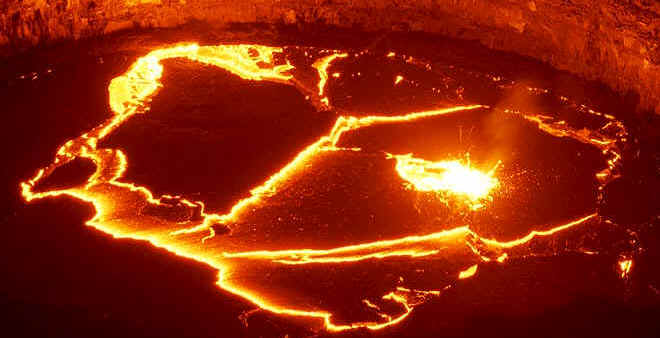
“Because Iraq's newly established political institutions were the creation of a foreign power, and because the concept of democratic government had no precedent in Iraqi history, the politicians in Baghdad lacked legitimacy and never developed deeply rooted constituencies. Thus, despite a constitution and an elected assembly, Iraqi politics was more a shifting alliance of important personalities and cliques than a democracy in the Western sense.”[1]
This frank assessment was not directed at the recent U.S. military occupation, but that of the British a few decades earlier. This was part of an effort by the British, French, and Americans to monopolize the world’s oil reserves. Iraq has the world’s third largest oil reserves, and most are easily accessible. Its modern history is one of exploitation by western oil companies backed by Anglo-American military force. "Time" magazine wrote about their apparent success in 1932:
“Anglo-Persian [now British Petroleum] and Royal Dutch-Shell (largely British-owned) have seen to it that Britain's oil shall never be turned off completely. Besides the oil of the King of Kings [Iran], Britain controls nearly one-half the concession in the famed Irak fields (split between a French group [now Total], a U.S. group (Standard companies [now Exxon-Mobil] plus Andrew William MelIon's Gulf Refining [now Chevron])”[2]
This “Irak Concession” was run as the foreign-controlled Irak Petroleum Company. It was initially the Turkish Petroleum Company formed in 1911 to develop Middle East oil fields within the Ottoman Empire. During World War I, the allies decided it was far more profitable to cut the Turks out by forming new “independent” Arab nations after the war to act as proxies for western interests.
Western control over Iraqi oil was lost over the next few decades as operations were gradually nationalized. This happened in all oil exporting nations as their governments became sophisticated and learned to read oil contracts and understand their consequences. They also realized that western oil companies cheated them whenever possible, and openly engaged in domestic political manipulations, to include bribery and backing coups.
In most oil exporting nations, western oil companies now operate only as contractors providing equipment and technical support. They have become minor players in the worldwide production of oil as prospects are very limited. For example, Exxon-Mobil is often called the world’s largest oil company. While it is the largest privately-owned oil company, it ranks just 20th among the world’s largest oil companies as measured by oil equivalent reserves.[3] British Petroleum ranks 17th when natural gas is included. The huge Russian and Chinese oil companies are larger and officially private, but under government control.
The future of major western oil companies is in doubt as international prospects diminish and their producing oil fields run dry. Domestic oil production peaked in the USA in 1970 and has gradually declined despite wonderful new technology. The U.S. government's “International Energy Outlook 2007” contains alarming statistics showing that at current rates of domestic production, the UK will run out of oil in 2013, the USA will run out of oil in 2017, and Mexico will run out of oil in 2018.[4]
Oil production in these nations peaked many years ago, and they currently produce around 14% of the world's oil. There is no doubt that some pockets of oil will still be found that will extend production a few more years. However, geologists have already scoured these nations for decades looking for oil using the world's most advanced technology. There are hopes that deepwater wells will slow the decline, but production problems make this doubtful.[5] There are untapped oil deposits in Alaska and off the Florida coast, but they equal just a couple years of current domestic oil production. A dire summary of this situation was provided oil executive Dick Cheney in 1999:
“…for over a hundred years we as an industry have had to deal with the pesky problem that once you find oil and pump it out of the ground you’ve got to turn around and find more or go out of business. Producing oil is obviously a self-depleting activity. Every year you’ve got to find and develop reserves equal to your output just to stand still, just to stay even. This is true for companies as well in the broader economic sense as it is for the world. So where is the oil going to come from? Governments and the national oil companies are obviously controlling about ninety per cent of the assets. Oil remains fundamentally a government business. While many regions of the world offer great oil opportunities, the Middle East , with two thirds of the world’s oil and the lowest cost, is still where the prize ultimately lies, even though companies are anxious for greater access there, progress continues to be slow.”[6]
The major western oil companies can remain profitable through their refining and retail networks. However, they will become much smaller and mostly customers of crude oil as their oil reserves deplete. While greater oil production by national oil companies will fill some of this loss for western consumers, it threatens the profits of western oil companies, and a few hundred thousand western jobs.
Hopes for a solution rose with the election of George W. Bush in 2000, along with a prominent oil executive as Vice President. Dick Cheney had led Halliburton downhill during his five years as CEO. He oversaw a disastrous merger with sickly Dresser Industries, and a failed effort to develop an oil field off Brazil . Despite these horrible results, Halliburton awarded him a $20 million bonus when he resigned to join the Bush campaign.
After the 2000 election, Cheney formed an energy task force and held secret meetings with major oil company executives. The conclusions of the task force remained secret, until 2002 when a FOIA lawsuit by Judicial Watch forced their release. A key topic were the oil reserves of Iraq , which are several times greater than those of all western oil companies. The documents include maps of Iraqi oil fields and lists of foreign oil firms interested in specific Iraqi oil fields.
Historical turbulence preserved most of Iraq’s oil reserves. It reached a peak production of six million barrels of day in the 1970s after several years of stability[, but declined sharply due to the Iraq-Iran war, the 1991 Gulf war, and a subsequent decade of UN sanctions. Iraq is the only country on Earth that offers the prospect of huge, rapid, increases in oil production to meet growing worldwide demand. Seizing Iraq’s oil reserves for export by western oil companies was the best solution to Dick Cheney’s question: “So where is the oil going to come from?”
Stealing the Prize
In 2003 Iraq became “the prize” mentioned by oil executive Dick Cheney back in 1999. Invading American troops focused on protecting oil facilities from sabotage and looting, leaving government buildings and even munitions storage sites unguarded. These were looted and provided the explosives for the thousands of bombs that have killed thousands of U.S. soldiers as part of an ongoing rebellion against the plot to steal Iraqi oil.This resistance was no surprise to Vice President Dick Cheney. When he was Secretary of Defense during the first Bush administration, they chose not to continue the battle all the way Baghdad in 1991 to dislodge a weakened Saddam Hussein. They assumed his failure would lead to a coup, which never occurred. Cheney defended this decision in August 1992 in response to a question about why the U.S. military did not “take out” Saddam Hussein:
“Once we had rounded him up and gotten rid of his government, then the question is what do you put in its place? You know, you then have accepted the responsibility for governing Iraq… Now what kind of government are you going to establish? Is it going to be a Kurdish government, or a Shi'ia government, or a Sunni government, or maybe a government based on the old Baathist Party, or some mixture thereof? You will have, I think by that time, lost the support of the Arab coalition that was so crucial to our operations over there... I would guess if we had gone in there, I would still have forces in Baghdad today, we'd be running the country. We would not have been able to get everybody out and bring everybody home."[7]
After that war, Cheney was lured into the oil business with a multi-million dollar offer to become CEO of the Halliburton oil company, despite having no experience in oil, or in any business other than government. By the time he returned to Washington in 2001, Cheney had become a wealthy proponent for western oil companies and formulated a plan to seize Iraqi oil. Evidence of his motive was found amongst the thousand of contracts posted on an U.S. Army website. On Dec.14, 2001, a contract “Planning for the Mission” was awarded to BRS, a subsidiary of Halliburton, which was headed by Cheney just one year prior. It stated:
“The planning effort was done by Brown & Root Services (BRS)
under a task order issued under the Army's Logistics Civil Augmentation
Program (LOGCAP) contract. The Commander, CENTCOM, identified a requirement
for contingency planning for repairing and providing for continuity of
operations of the Iraqi oil infrastructure. This included planning for
extinguishing oil well fires and assessing damage to oil facilities in the
immediate aftermath of hostilities.
The Army Field Support Command also issued a letter contract to the planning
contractor, BRS, that was primarily for pre-positioning of fire fighting
equipment and the staffing and training of damage assessment teams that could
be ready to deploy on short notice. This effort was necessary to enable rapid
response to oil well fires. The estimated cost plus fixed fee of this contract
is $37.5 million. The current LOGCAP contract was awarded to BRS on December
14, 2001, after a competitive source selection process.”[8]
The date is significant because it was awarded less than a year after Cheney entered office, and many months before the Bush administration declared Iraq a serious threat to the USA. During that period, the U.S. military began flying weapons into northern Iraq to arm Kurds and encouraged them to conduct terror attacks against the Iraqi government, while the U.S. military stepped up occasional air strikes against Iraqi military targets. These activities were never sanctioned by the UN and were clearly illegal under international law.
Invading Iraq had nothing to do with “Weapons of Mass
Destruction” (WMDs). One of President Bush's more outrageous lies is that he
did not deceive the American people to justify the invasion of Iraq. "We
were fooled by bad intelligence" is the excuse accepted by most
Americans. They cannot recall that in 2003, as U.S. forces prepared to invade
Iraq, President Bush demanded that Saddam Hussein permit UN inspectors
"free and unfettered access" to search Iraq for WMDs. Saddam Hussein
surprised everyone by agreeing, and UN inspectors were allowed to roam Iraq at
will and check all the locations that Colin Powell had recently told the UN
Assembly were actively producing illegal weapons.
After several weeks, the dozens of UN inspector teams had found nothing, and
the dirty, rusty conditions of the suspect sites showed nothing had been made
there for years. The Bush administration insisted they had other proof that
WMDs were in Iraq. Chief UN inspector Hans Blix publicly stated that if they
would send him a clue, he would have UN teams inspect the next day. Iraq even
proposed that U.S. military officers join the UN inspectors. As a result,
President Bush had perfect intelligence that Iraq had no WMDs. The US military
had complete freedom to fly anywhere in Iraq to observe activity. UN
inspectors were on the ground to check any suspect site, and were permitted to
stay in Iraq as long as they liked to pursue new leads. 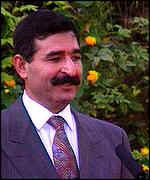
This confirmed what General Hussein Kamel, Iraq's weapons chief who defected
from the regime in 1995, told UN inspectors and the CIA, that Iraq had
destroyed its entire stockpile of chemical and biological weapons and banned
missiles.[9] Kamel's defection presented a major problem for those seeking to
overthrow the Iraqi government. UN sanctions imposed as part of the 1990
conflict with Kuwait remained in force. By 1998, most UN members wanted
sanctions removed since UN inspectors had found no WMDs since 1995. Kamel's
revelations justified their removal, but were kept secret while proposals to
lift sanctions were blocked by the United States.
Kamel was a threat, yet the solution was simple since he was in Jordan under the control of the CIA. It was announced that Kamel somehow slipped away and returned to Iraq under the bizarre delusion that he wouldn't be harmed. It was no surprise that Kamel was quickly executed, and no surprise that the Western media accepted this absurd tale as fact. It seems obvious that Kamel was forcibly sent back to Iraq, while the detailed information he provided was shelved. This secret was leaked to Newsweek in 2003 just prior to the invasion of Iraq, which resulted in a small story that was ignored by the rest of the corporate media.[10]
There were other reasons the USA invaded and occupied Iraq in 2003. American weapons contractors are always supportive of actions that result in more contracts. The U.S. military wanted justification for a larger force and budget. American Generals sought their chance to organize and lead major combat forces, especially against a clearly inferior enemy like the Iraqi military that had no desire to fight. The presence of permanent American airbases in Saudi Arabia angered many Muslims. These were promptly closed after permanent airbases were ready in Iraq.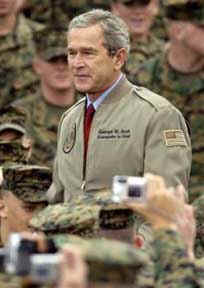 In the 1990s, the U.S. military began to contract much of its
combat service support functions to private firms. Companies like Halliburton
raked in billions of dollars supporting operations in Albania, Kosovo, and
elsewhere, and they wanted more. Supporters of Israeli territorial
expansion wanted to replace yet another opposing Arab nation with a docile
western puppet regime, like those of Egypt and Jordan. All these forces played
upon George W. Bush’s vision of grandeur as a “wartime President.”
In the 1990s, the U.S. military began to contract much of its
combat service support functions to private firms. Companies like Halliburton
raked in billions of dollars supporting operations in Albania, Kosovo, and
elsewhere, and they wanted more. Supporters of Israeli territorial
expansion wanted to replace yet another opposing Arab nation with a docile
western puppet regime, like those of Egypt and Jordan. All these forces played
upon George W. Bush’s vision of grandeur as a “wartime President.”
Anyone who doubts the President misled the American people and Congress need only read Bush's Oct. 7, 2002 public speech made a week before Congress voted to support the Iraq invasion.[11] That speech leaves no doubt that Iraq had tons of WMDs. This was the main topic he addressed; the word "democracy" was not used. Reports from Hussein Kamel were not mentioned, and later firsthand reports from UN inspectors on the ground that no WMDs existed failed to halt the invasion of Iraq. The fact that Bush lied to justify a war is hard for most Americans to accept. It is rarely mentioned in the corporate media because they fear upsetting Americans who prefer to think their leaders are incompetent, rather than dangerous and heartless.
The evidence is overwhelming that the primary reason the U.S. military invaded Iraq was to return control of Iraq’s oil reserves to western oil companies. Americans should not assume this action was taken to assure cheap oil for the American consumer. Chevron will charge just as much for Iraqi crude oil as Iraq or other national oil companies. What matters is who will profit from pumping Iraqi oil out of the ground - Iraq or western oil companies.
Iraqis Rebel
Since the 2003 American invasion of Iraq, the Bush administration has gradually admitted to blatant lies about its objectives. It admitted there were no WMDs in Iraq. It admitted that several permanent U.S. military bases will remain in Iraq, forever, even though most Iraqis and most Americans want all U.S. troops to leave. Clear evidence has now emerged to confirm suspicions of the ultimate goal, a return of Iraqi oil fields to the control of western oil companies.
Soon after invading Iraq, the Americans were so confident of their success that they explored the idea of opening a pipeline to pump Iraqi oil to Israel.[12] This naïve idea so outraged Iraqis that it was dropped. One of the next steps taken by the American occupiers was to disband the Iraqi army and fire all Baath party members from government jobs. This is widely viewed a mistake today, if one assumes that the goal of the invasion was to simply oust Saddam Hussein from power. It is now clear that Iraq is to become an American colony so control of its oil reserves could be returned to western oil companies. This would never be tolerated by Iraqi nationalists, so it was necessary to abolish all organizations and fire all people who might object.
If the Iraqi army had remained intact, it would pose a threat
once it became apparent that the Americans would never leave. The loyalty of
career Iraqi officers who once served in a truly independent Iraq would always
be suspect. Retired U.S. Army General Jay Garner organized and initially led the
American occupation force, but was not told of the oil objective. He refused
demands from the White House to disband the Iraqi army since it was essential to
his plans for stability.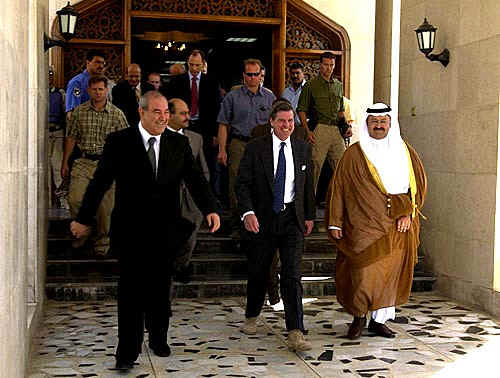
As a result, Garner was fired after just two months and replaced by L. Paul Bremer III, a wealthy Washington insider with the exact same schooling as George W. Bush – Phillips Academy (an exclusive private high school), Yale ’63, and an MBA from Harvard ’66. He had no military experience, no civil administration experience, and no experience in the Arab world. Bremer quickly disbanded the Iraqi army, fired thousands of Baathist administrators and educators, and announce the oil industry would privatized. These actions infuriated many Iraqis, resulting in an armed rebellion. The insurgents were aided by incompetent U.S. military officers who outraged all Iraqis by bombing Iraqi cities on a daily basis to root out insurgents.[13] This worsened security problems and hindered efforts to increase oil production.
One of the key benchmarks for success set by the White House requires the Iraqi Parliament to rubberstamp the privatization of the Iraq National Oil Company. This is so strongly opposed by Iraqis that even the normally malleable American-approved members of Parliament resisted, and dozens resigned. The Bush administration and its supportive corporate media pretended the problem is one of sharing oil profits among different parts of Iraq. That is an issue, but the primary obstacle is that Iraqi oil production will fall into the hands of foreigners. There is also a strange provision that allows regional authorities to enter into oil agreements. This opens vast opportunities for bribery and contractual deception since it avoids scrutiny by experienced Iraqi experts in Baghdad. The Iraqi oil workers union strongly opposes this effort and has threatened to strike.
This resistance has irritated western oil company executives who quietly waited on the sidelines for their prize. Work focused on producing more from existing wells, using mostly subcontractors to hide their presence. The corporate media does its part by suppressing news of major western oil companies operating in Iraq. However, earlier this year Reuters revealed that British Petroleum has been operating in southern Iraq around the Rumaila fields that are partially developed and have combined potential output capacity of 500,000 barrels per day.[14] This just happens to be the same area occupied by British troops.
Oil executives recently demonstrated their irritation when Hunt Oil signed an oil production agreement with the Kurdistan Regional Government. Iraq’s prime minister called the agreement illegal, and it was publicly denounced by President Bush, who claimed that he was not consulted. However, Hunt chief executive Ray Hunt is a friend of the president, a major backer of the Bush presidential library at Southern Methodist University, and a member of the President's Foreign Intelligence Advisory Board.[15] It is unbelievable that Bush, or at least Cheney, did not approve of the announcement, and probably arranged the deal to prod the Iraqi government to approve privatization. The message is that if they refuse to rubberstamp the plan, oil companies will proceed anyway,
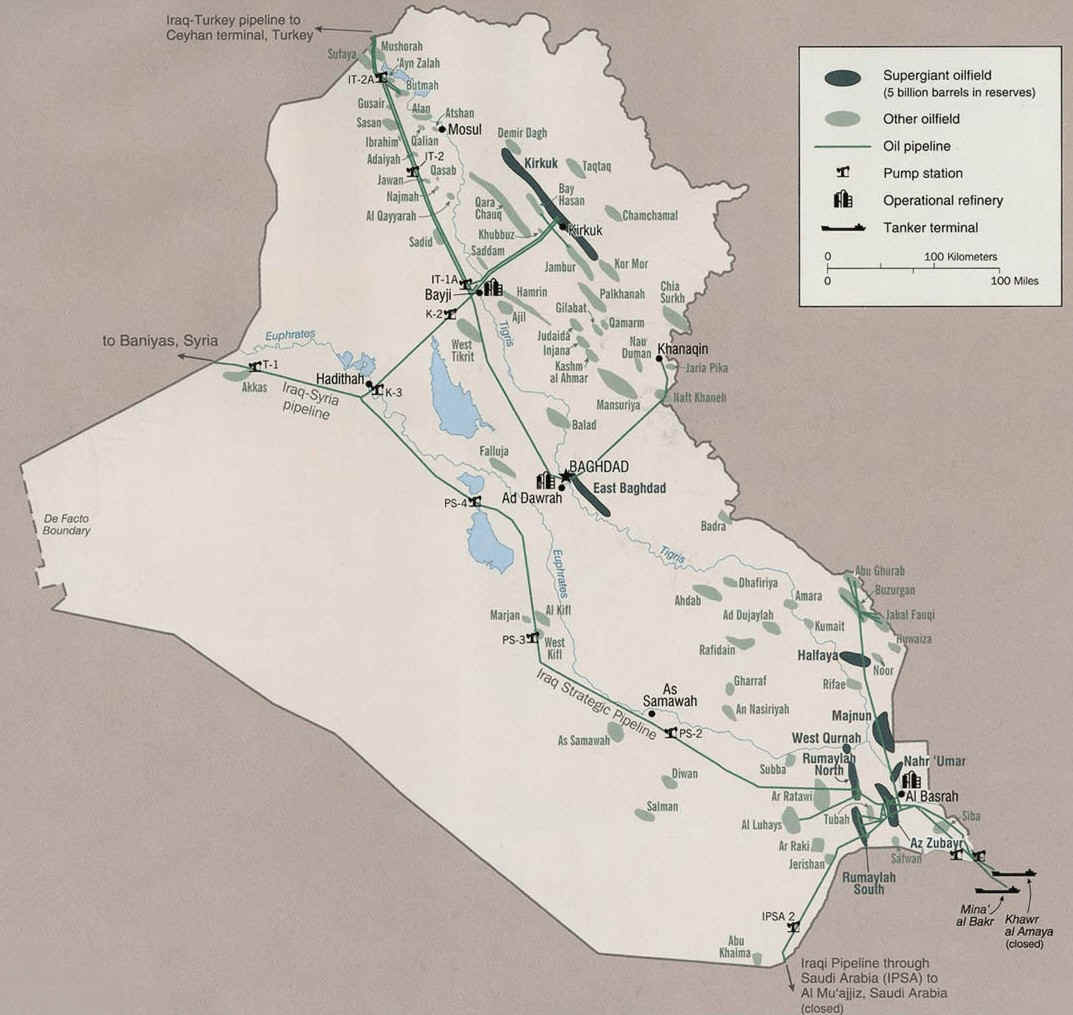
The weak Iraqi central government will eventually accept privatization of their nation’s oil wealth, even if this requires an American backed coup, which was common during the Vietnam War. The next step is to sell oil leases. This will done in private using American appointed Iraqi agents. They will learn that western oil companies already have valid leases for most Iraqi oil fields from decades ago. They may have expired, but since they were illegally cancelled, the new lawful Iraqi government must accept an extension, even though they are overly generous.
Once that is accepted and formalized, the question of compensation will arise. Western oil companies will present evidence that billions of barrels of oil have been illegally extracted from these fields the past few decades by the Iraqi government. Since these oil companies held valid production sharing contracts, they are due billions of dollars in reimbursement. The Iraqi government lacks funds to pay, so oil companies will withhold the government’s share of oil export revenues until this money is repaid, which may take decades.
It doesn’t matter what the eventual oil privatization law says, but how it will be “interpreted” American appointed Iraqi judges. This will provide western oil companies with massive new profits and huge oil reserves, or recovered reserves in their minds. Western oil consumers may assume this will help them as well; however, Iraq’s National Oil Company is just as anxious to explore and pump as much oil as they can to western consumers.
The only problem at this point is the uncooperative Iraqi citizenry and resulting armed rebellion that makes profitable oil operations difficult. Knowledge that control of oil reserves is the prime objective in Iraq is so widespread among Washington DC insiders that former chairmen of the Federal Reserve, Alan Greenspan, wrote in his recently published memoir “The Age of Turbulence”: “I am saddened that it is politically inconvenient to acknowledge what everyone knows: the Iraq war is largely about oil."
This led to a media furor in which Greenspan was forced into damage control. He stated that his lucid comment was misleading. Greenspan said he meant that Saddam Hussein threatened Middle East oil supplies passing through the Strait of Hormuz, as though such a comment is “politically inconvenient.” That fake correction was accepted by the media, even though in 2003 the Iraqi military had no air force, no navy, and an army was so weakened by sanctions that it was mostly a paramilitary force. Greenspan wrote the truth because he was unaware that stealing Iraqi oil remained a taboo topic for the general public.[16]
Other prominent Americans attempted to inform the American people, but their message is ignored by the corporate media. Most Americans would be surprised to hear that a Democratic presidential candidate, U.S. Rep. Dennis Kucinich of Ohio, recently proclaimed: "As I have said for five years, this war is about oil. The Bush administration desires private control of Iraqi oil, but we have no right to force Iraqis to give up control of their oil,"[17] Meanwhile, the Iraqi people and the U.S. military are mired in a bloody stalemate.
The Turks Will Return
The U.S. military has an old acronym for current the situation in Iraq – FUBAR.[18] As political opposition mounts, the USA has three choices:
1) Continue to slog on and hope things improve. President Bush will stay with this course since it allows him to retire with the delusion it has been a success. However, a new President will arrive 2009 with a mandate to do something different in Iraq.
2) Declare victory and withdraw, leaving behind a weak Iraqi government with little popular support, as was done in Vietnam. It will likely collapse into chaos while Iraqis are blamed for not appreciating their chance for “freedom.”
3) Offer the Turks their former oil fields in northern Iraq if they surge across the border with 200,000 troops to stabilize northern and central Iraq.
The Turks never accepted the loss of their Mosul province to the British in 1927. After World War I, they agreed with the formation of new Arab nations from parts of their collapsed Ottoman Empire, but the Mosul region was mostly Kurdish and Turkish. The western oil companies were not satisfied after taking control of most oil fields in the Middle East; they wanted them all. In the 1920s, the new Turkish government was weak militarily and politically, yet refused to yield to British demands to cede the oil-rich Mosul region.
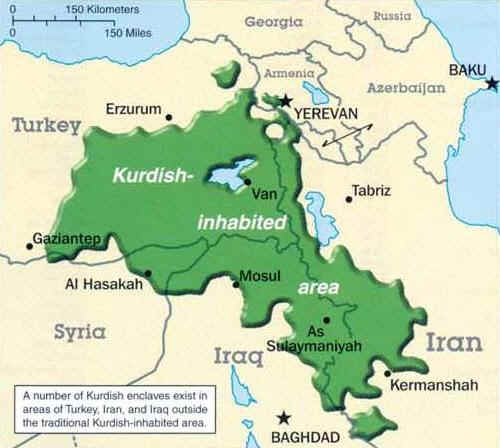 The British suggested that the issue be discussed in the new
League of Nations, where Turkey was not a member. It was no surprise that
this British dominated league awarded Turkey’s Mosul region to the new
“nation” of Iraq in 1927. Turkey rejected the decision, yet lacked the
military power to eject the British Army, which had remained in the Mosul
region since 1918.
The British suggested that the issue be discussed in the new
League of Nations, where Turkey was not a member. It was no surprise that
this British dominated league awarded Turkey’s Mosul region to the new
“nation” of Iraq in 1927. Turkey rejected the decision, yet lacked the
military power to eject the British Army, which had remained in the Mosul
region since 1918.
Since that time, Turkey has become a major military power whose Generals grew up with tales of the great Ottoman Empire. They are excited by the possible reconquest of northern Iraq, which seems within reach as American control weakens and chaos ensues. Despite four years of failure, the American military may remain in Iraq several more years. Those in charge of the USA feel that spending billions of dollars and sacrificing 100 American soldiers each month is worth the price to remain in control of America’s oil-rich colony of Iraq.
Although the majority of Americans want troops to come home, no leading presidential candidate favors a total withdrawal of American military forces from Iraq. While many campaign for a withdrawal of American combat forces, the fine print in their platform shows they favor keeping some permanent forces and military bases in Iraq. The few candidates that favor a total withdrawal of U.S. troops are deemed to have no chance at winning by the corporate media, and receive little news coverage. This demonstrates the power of major oil companies in America, where neither party embraces the desires of the majority of voters.
Leading Republican candidates fear that pulling out any troops will worsen the chaos and lead to an embarrassing military retreat. Given the operational strain on the U.S. Army and Marine Corps, such a retreat may occur anyway. Many soldiers are deploying for their fourth one-year tour to Iraq, after less than a year at home. They know the effort is pointless, so their morale is near a breaking point. However, negotiating a diplomatic path would be an admission of failure by American leaders with visions of imperial grandeur. This arrogance has been demonstrated by a refusal to seek an Iraqi solution with Syria, Iran, and Turkey.
Following the victory script for the Vietnam War, most of Iraq is gradually being turned over to the Iraqi army, whose loyalty is split among dozens of tribal groups. As chaos increases, the Iraqis will be blamed for the disaster. Any suggestion that the occupation failed because of American arrogance, incompetence, and greed will be rejected as treasonous. Like with Vietnam, blame will be directed at disloyal critics who didn’t allow the invincible U.S. military the time or resources to “finish the job.”
A realistic strategy would involve Turkish pride and a desire to reclaim oil fields. The USA could invite some 200,000 Turkish peacekeepers to take over most of Iraq, to include dangerous Baghdad. Ideally, Arab nations would also send a few thousand peacekeepers. The U.S. military could then reduce its forces from an unsustainable 160,000 to perhaps 40,000; all based in the Shia areas of southern Iraq, which also has plenty of oil. This would slash the complexity and costs for the American force now dependent on a single, lengthy ground supply route to Kuwait. The Shia should be less hostile to an American military presence, since it would offer protection from a new Sunni dominated government in Baghdad, backed by the Sunni neighbors of Turkey, Jordan, Kuwait, and Saudi Arabia.
As a NATO ally, Turkey was encouraged to join the invasion of Iraq in 2003. However, the idea was dropped when senior Turkish Generals insisted that Mosul and Kirkuk were Turkish cities. American Generals were stunned, and feared losing control of northern Iraq and its oil fields to the Turks.[19] Times have changed, so the solution is for the USA to secretly agree to allow Turkey to eventually annex the oil-rich Mosul region of northwestern Iraq.
Turkey would control the oil in that region and profit from it. It is already pumped northward through a Turkish pipeline to the Mediterranean. This will pay for their operational costs in Iraq and eventually provide them with substantial oil wealth. Kurds are the majority in this region, yet the Turks consider them ethnic cousins. Some 5 million Kurds live in Iraq, yet 15 million live in Turkey where they represent 20% of the population and hold seats in Parliament. An eventual Turkish annexation of northwestern Iraq would add another two million Kurds, plus one million ethnic Turkmen and a million Arabs. Turkey has a democratic, secular government that serves as a model for the type the West wants established throughout the Muslim world.
A little discussed time-bomb in Iraq is that the Kurdistan Regional Government is ready to declare independence over the objections of the Iraqi government. This has been prevented by a long-standing threat from Turkey to attack any self-declared Kurdish state, which it would view as base to encourage a violent independence movement among its Kurds who populate much of eastern Turkey. The Kurdish government’s opinion of this plan is of little consequence. They can accept the borders of a Kurdish state as drawn by the Turks and Americans, or face annihilation by the Turkish army.
An offer to split northern Iraq with an independent a Kurdish state should be acceptable to the Turkish government. Any Iraqi Kurds who dislike living under Turkish rule can move to Kurdistan, while Arabs are welcome to move south, whence most came during Saddam Hussein’s rule to assert Arab control over the region’s oil fields. In addition, any Kurds who hate living in other parts of Turkey could move to this new Kurdish state. It would also provide the Turks with a dumping ground to deport troublesome Kurd revolutionaries from Turkey.
In return, the Turks would send 200,000 peacekeepers into Iraq, to include dangerous Baghdad. Turks are Sunni Muslims, so their arrival would be welcome by Sunni Arabs who dominate that area, and now fight against the weak Shia dominated central government in Baghdad. The million ethnic Turkmen living in Iraq would be enthusiastic, and well as many former Iraqi Army officers, whose predecessors were officers in the Ottoman Empire.
The small Sunni al Qaeda movement in Iraq would disintegrate after the Christian invaders leave their areas. Increased stability would allow increased oil production, benefiting Iraqis, Kurds, Turks, western oil companies, and consumers. After a few years, the fate of Iraq can be decided. Turkey could officially annex northwestern Iraq, while the rest of the nation may function without foreign troops, or split with a Sunni dominated government for central and western Iraq, and a new Shia dominated nation in the south.
This compromise is the best solution to the chaos of today. Iraq was a united nation only because of the Baathist party and its universal army. Once those institutions were abolished, Iraq fragmented back into dozens of tribal groups. The USA hasn’t the expertise or temperament to rebuild Iraq, so it must ask for help. If it declares victory and abandons Iraq to chaos, the Turks will seize all of northern Iraq anyway, using the excuse of fighting Kurd terrorists and protecting the lives of ethnic Turkmen.[20] Fortunately, the Turks are willing to help, so long as they can reclaim their Mosul region and its precious oil fields.
________________________________________________
[1] “ Iraq : A Country Study”, World War I and the British Mandate, U.S. Library of Congress, May 1988, http://lcweb2.loc.gov/frd/cs/iqtoc.html
[2] “Royal Squeeze”, Time, Dec. 12, 1932, http://www.time.com/time/magazine/article/0,9171,929496-2,00.html
[3] “World’s Largest Oil and Gas Companies”, PetroStrategies, accessed Sept. 20, 2007, http://www.petrostrategies.org/Links/Worlds_Largest_Oil_and_Gas_Companies_Sites.htm
[4] “International Energy Outlook 2007”, EIA. Chapter 3, http://www.eia.doe.gov/oiaf/ieo/pdf/oil.pdf These projections are wildly optimistic as they assume production will magically rise to meet growing demand.
[5] “Thunder Horse Breaks a Leg”, APIS, Apr. 24, 2007, http://www.apisltd.com/index.php?option=com_content&task=view&id=689&Itemid=45
[6] “Dick Cheney Speech”, The Institute of Petroleum, Autumn 1999, http://web.archive.org/web/20000414054656/http://www.petroleum.co.uk/speeches.htm
[7] “Cheney changed his view on Iraq”, Seattle PI, Sept. 29, 2004, http://seattlepi.nwsource.com/national/192908_cheney29.htm
[8] The Army has since removed this contract notice from its website, once found here: http://www.hq.usace.army.mil/cepa/iraq/factsheet.htm . A copy can be found here: http://www.g2mil.com/2001gemscombo.htm
[10] "Exclusive: The Defectors Secrets", Newsweek,
Mar. 3, 2003, http://www.ratical.org/ratville/CAH/Kamel022403.html
[11] "President Bush Outlines Iraqi Threat", Oct. 7, 2002,
Cincinnati, Ohio speech, http://www.whitehouse.gov/news/releases/2002/10/20021007-8.html
[12] “An old Israel-Iraq oil line – Reopening?, Christian Science Monitor, Apr. 23, 2003, http://www.csmonitor.com/2003/0423/p11s01-coop.html
[13] “An Insurgency is Not a War”, APIS, July 5, 2007, http://www.apisltd.com/index.php?option=com_content&task=view&id=705&Itemid=49
[14] “BP eyes role in Iraq oil sector”, Reuters, Apr. 17, 2007, http://www.iraqupdates.com/p_articles.php/article/16549
[15] “Bush fears Hunt Oil deal will hurt Iraq”, Dallas Morning News, Sept. 21, 2007, http://www.dallasnews.com/sharedcontent/dws/bus/stories/092107dnbuskurdishoil.34410bf.html
[16] “Greenspan Misses Cheney’s Memo”, Antiwar.com, Sept. 17, 2007, http://www.antiwar.com/mcgovern/?articleid=11626
[17] “Bush fears Hunt Oil deal will hurt Iraq”, Dallas Morning News, Sept. 21, 2007, http://www.dallasnews.com/sharedcontent/dws/bus/stories/092107dnbuskurdishoil.34410bf.html
[18] FUBAR (Fucked Up Beyond All Repair)
[19] The result of that 2003 meeting between senior American and Turkish Generals was later passed along to the author by a senior U.S. Army officer.
[20] “The Ottoman Empire May Rise Again”, APIS, May 28, 2007, http://www.apisltd.com/index.php?option=com_content&task=view&id=702&Itemid=49
Carlton Meyer editorG2mil@Gmail.com
©2007 SandersResearch